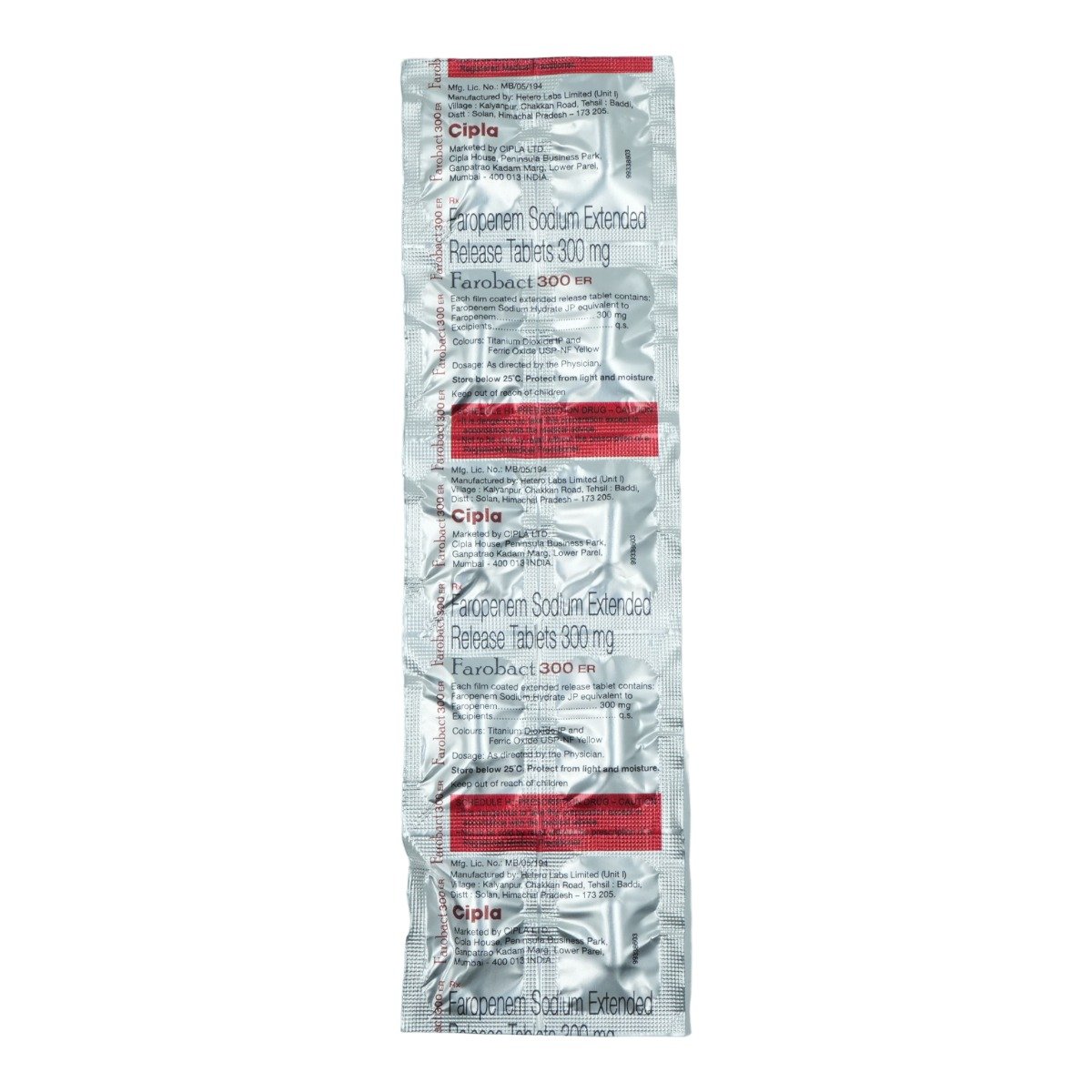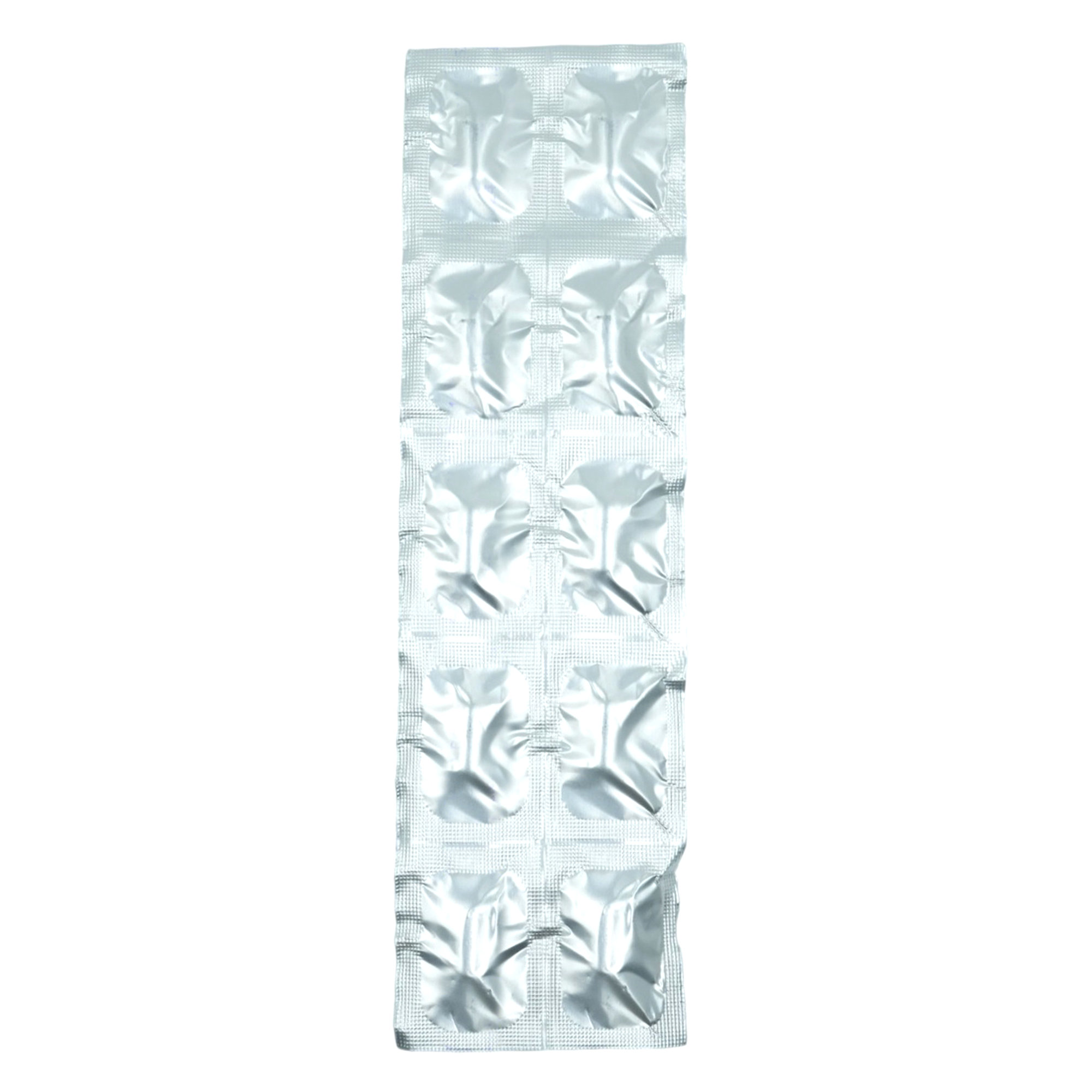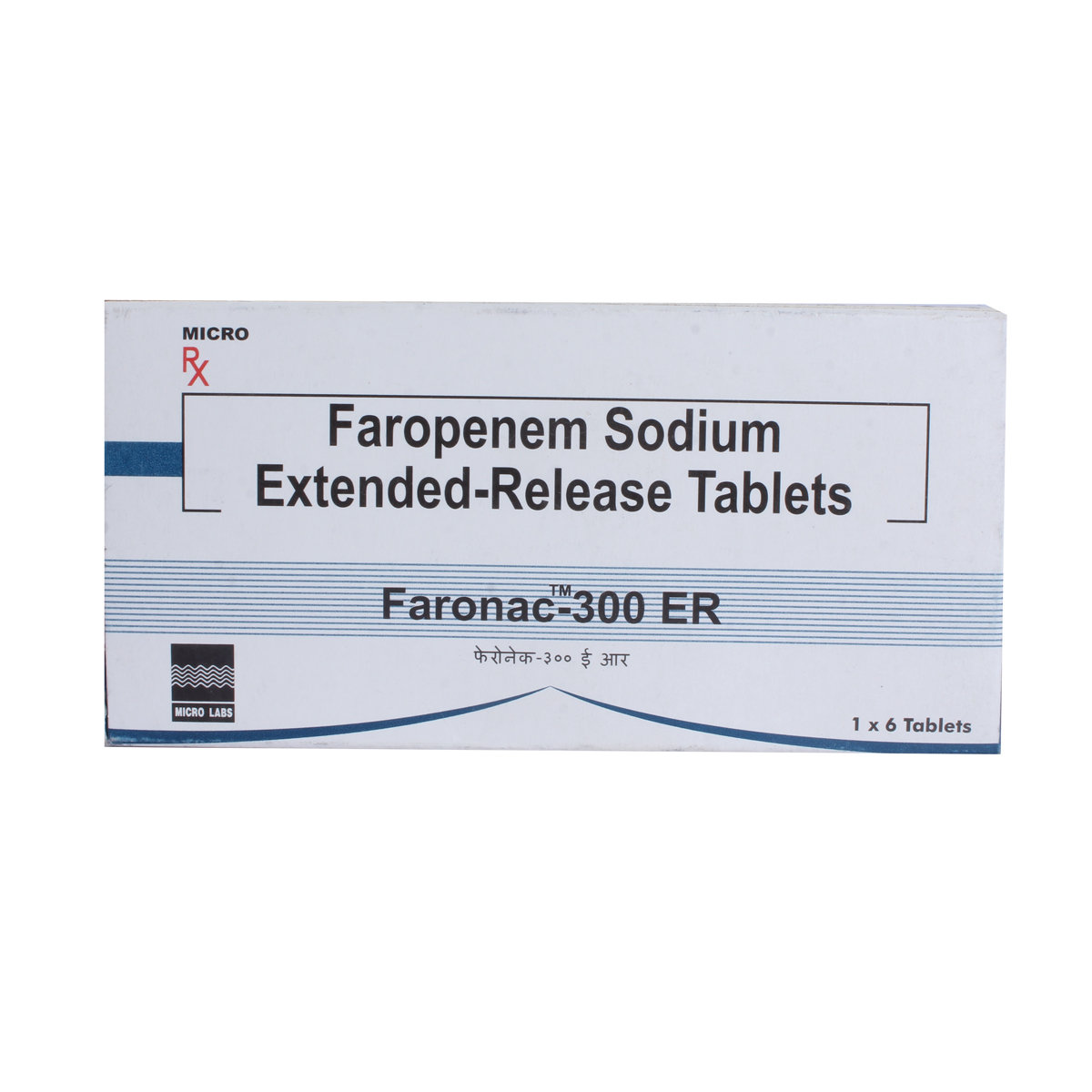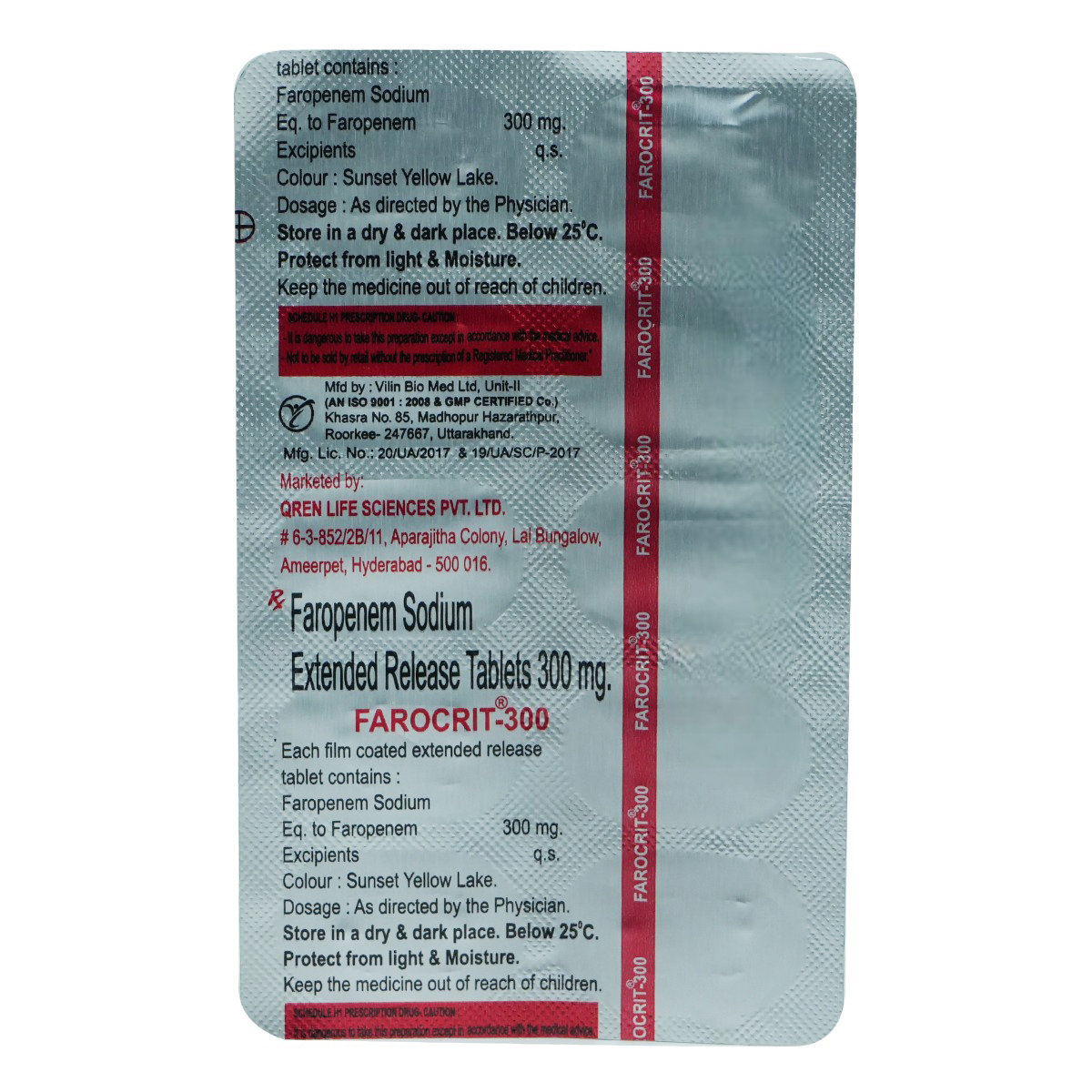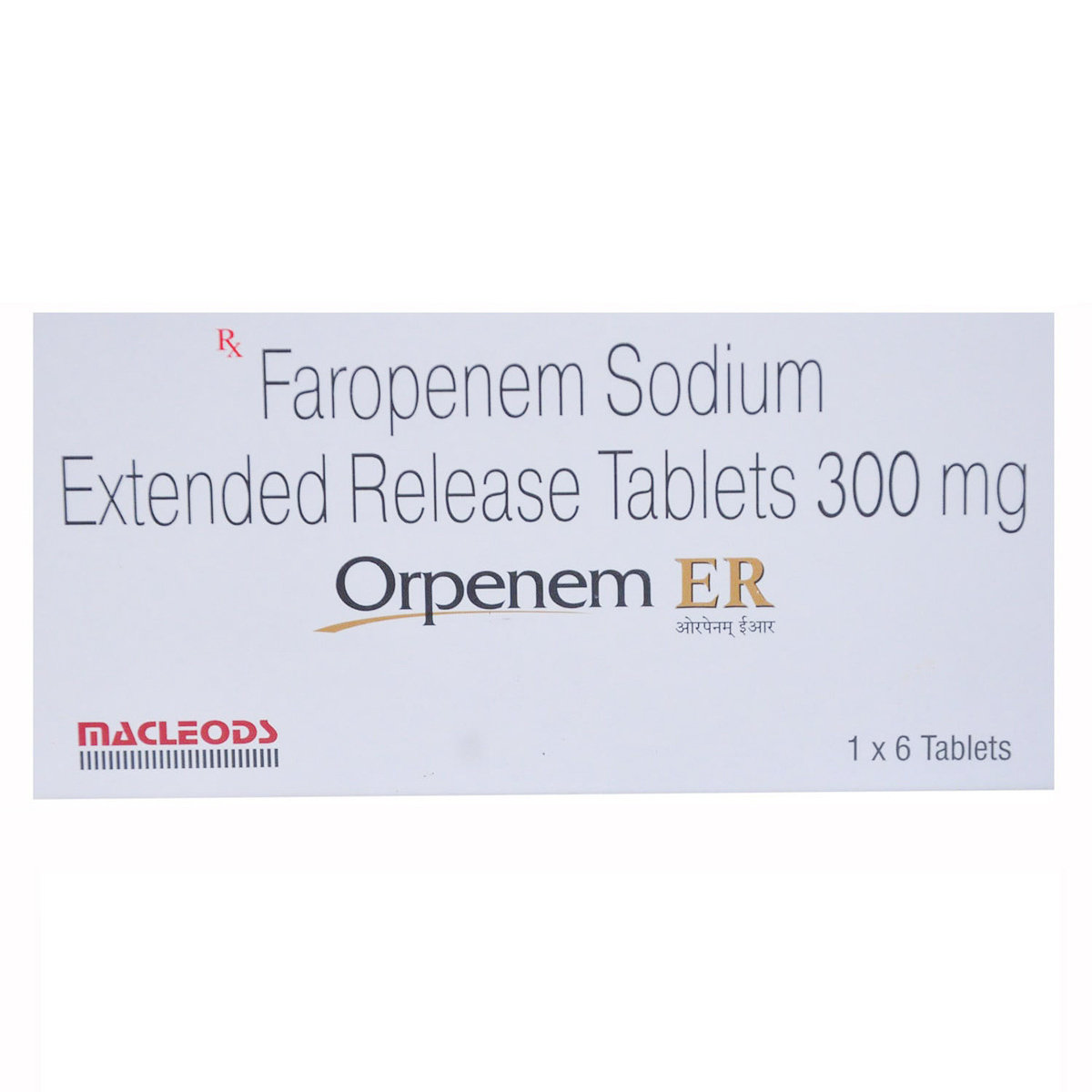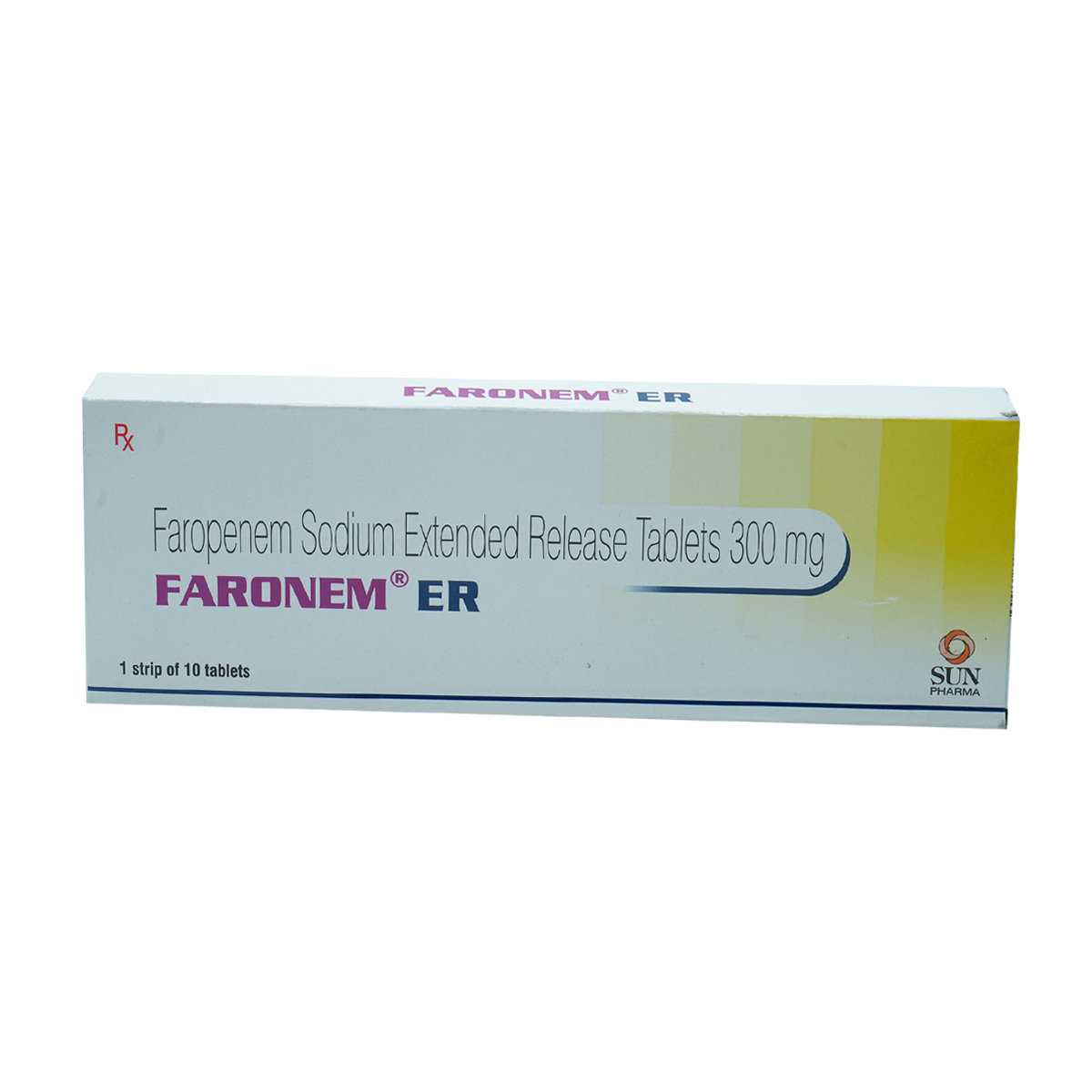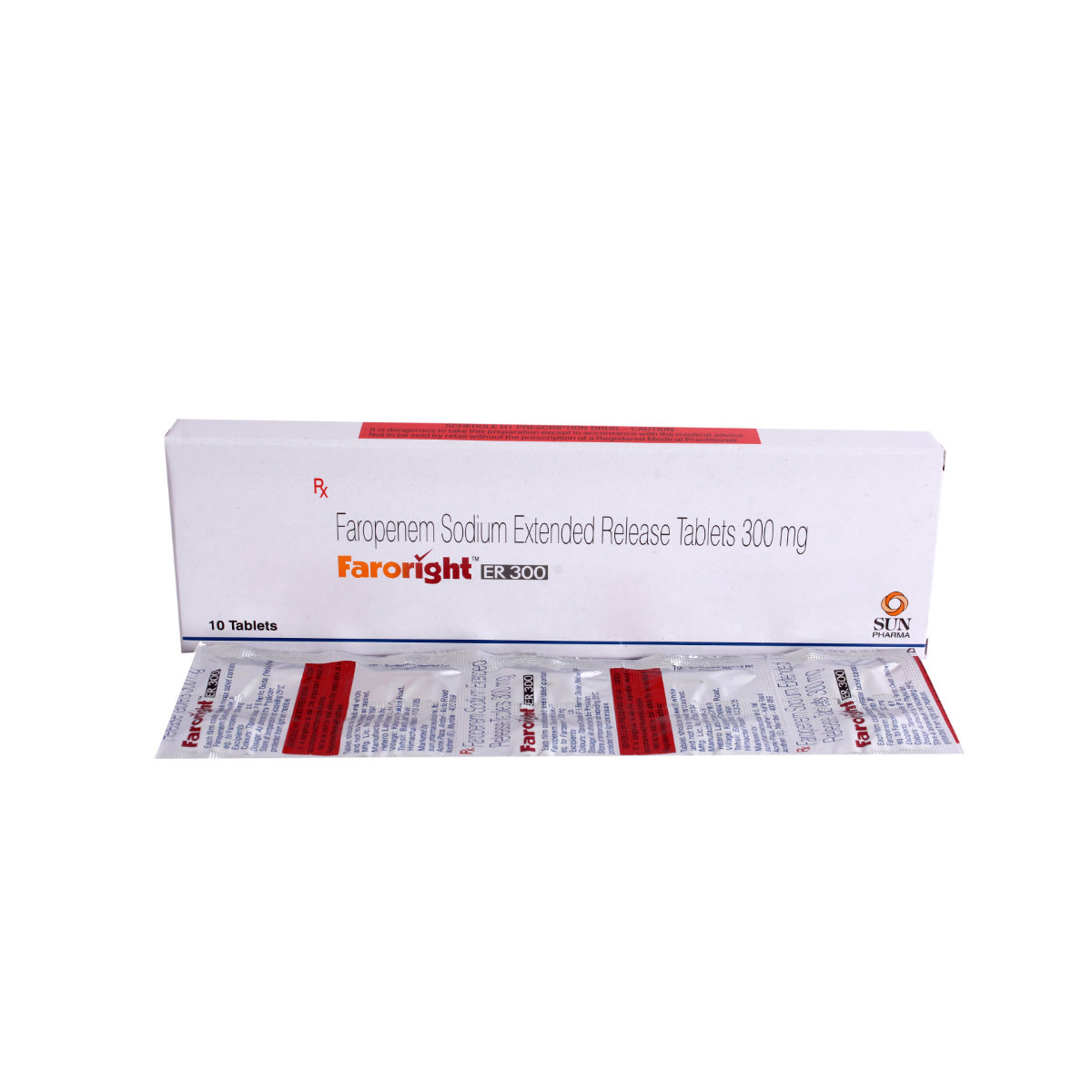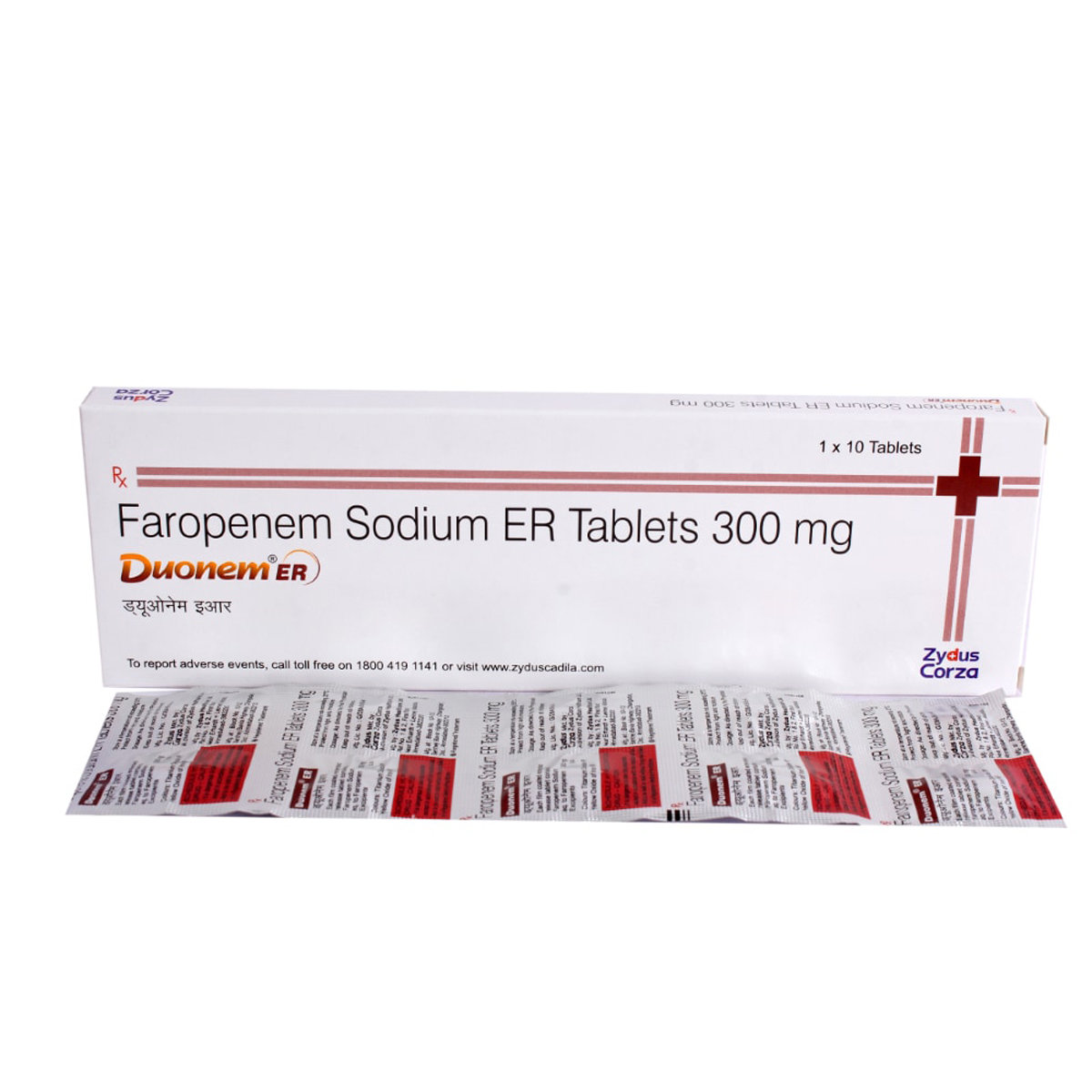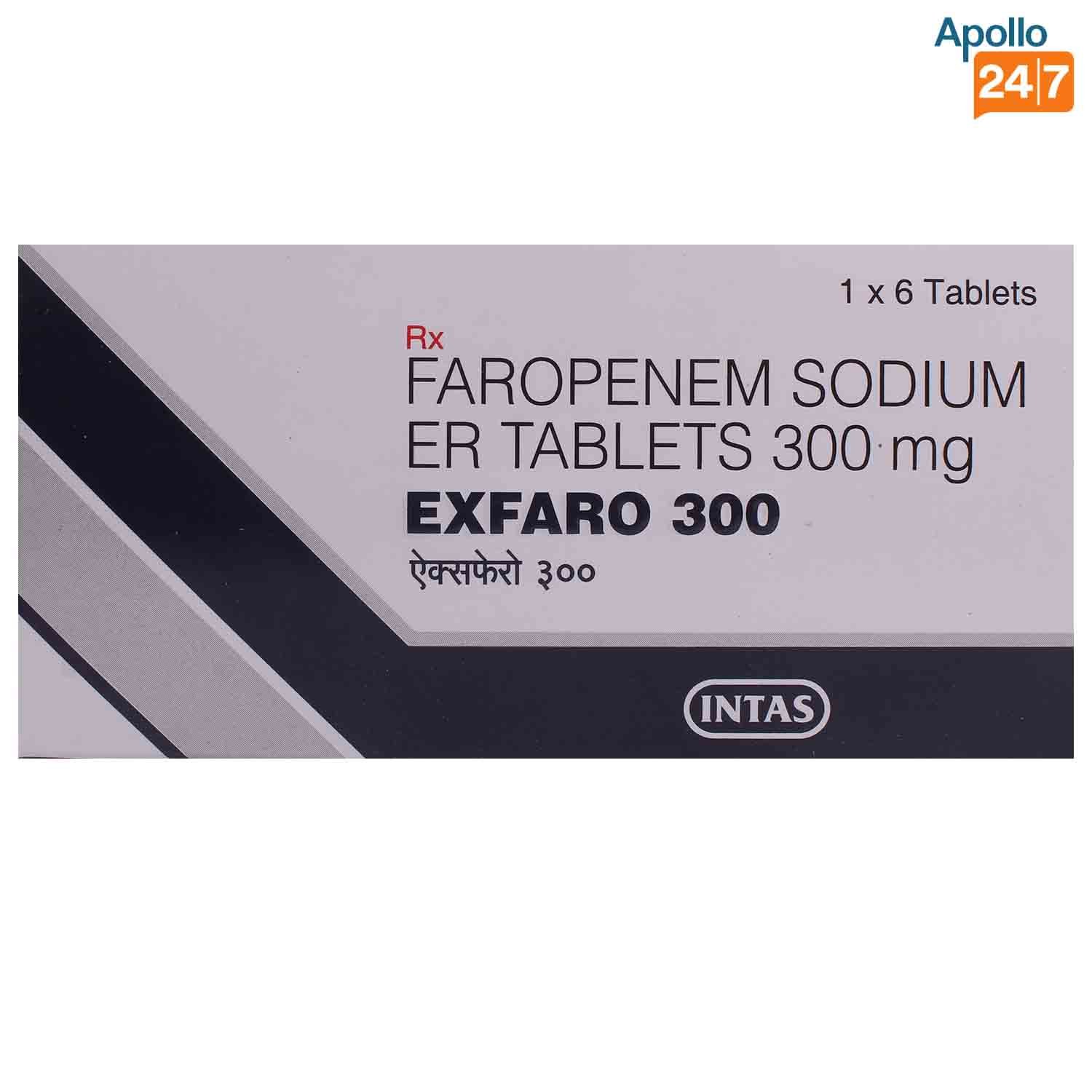Farobact 300 mg ER Tablet 10's
MRP ₹1308.5
(Inclusive of all Taxes)
₹196.3 Cashback (15%)
Selected Pack Size:10
10 ₹1177.7
(₹117.77 per unit)
Out of stock
Provide Delivery Location
Online payment accepted
 Prescription drug
Prescription drugWhats That
Composition :
Manufacturer/Marketer :
Consume Type :
Expires on or after :
Return Policy :
About Farobact 300 mg ER Tablet 1
Farobact 300 mg ER Tablet 1 belongs to a class of drugs called beta-lactam antibiotics used in the treatment of several bacterial infections of the urinary tract, respiratory tract, skin, ears, nose, and gynecological infections. Bacterial infection is a condition in which harmful bacteria grow in the body and cause infection. It can infect any part of the body and multiply very quickly.
Farobact 300 mg ER Tablet 1 contains Faropenem, an antibiotic that kills bacteria (bactericidal) by inhibiting the formation of the bacterial cell wall (a protective covering) that is necessary for their survival.
Take Farobact 300 mg ER Tablet 1 as prescribed. Your doctor will advise you on how often you take your tablets based on your medical condition. In some cases, you may experience nausea, diarrhoea, stomach pain, and rash. Most of these side effects of Farobact 300 mg ER Tablet 1 do not require medical attention and gradually resolve over time. However, if the side effects persist or worsen, please consult your doctor.
If you are known to be allergic to Farobact 300 mg ER Tablet 1 or any other medicines, please tell your doctor. If you are pregnant or breastfeeding, please inform your doctor before taking Farobact 300 mg ER Tablet 1. If you have kidney problems, a family history of atopy (tendency to develop allergic reactions), glucose-galactose malabsorption, Lapp lactase deficiency, or galactose intolerance, inform your doctor before taking Farobact 300 mg ER Tablet 1. Farobact 300 mg ER Tablet 1 may cause vitamin K or vitamin B deficiency in some patients, especially in older people and in patients with poor oral intake. However, consult your doctor if you notice symptoms such as bleeding easily, loss of appetite, swelling of the tongue, or stomatitis (swelling and sores in the mouth).
Uses of Farobact 300 mg ER Tablet 1
Directions for Use
Key Benefits
Farobact 300 mg ER Tablet 1 is a broad-spectrum antibiotic that acts against both aerobic (grow in the presence of oxygen) and anaerobic (grow in the absence of oxygen) gram-negative and gram-positive bacteria. Farobact 300 mg ER Tablet 1 is used in the treatment of several bacterial infections of the urinary tract, respiratory tract, skin, ears, nose, and gynecological infections. Farobact 300 mg ER Tablet 1 inhibits the formation of the bacterial cell wall (a protective covering) that is necessary for their survival. Thereby, kills bacteria.
Storage
Drug Warnings
Regular monitoring of kidney and liver functioning is recommended while taking Farobact 300 mg ER Tablet 1. If you are a breastfeeding or pregnant woman, please consult a doctor before taking Farobact 300 mg ER Tablet 1. If you notice blood in stools or have severe stomach pain with diarrhoea, contact your doctor immediately. Farobact 300 mg ER Tablet 1 may cause vitamin K or vitamin B deficiency in some patients especially in elderly people and in patients with poor oral intake. However, consult your doctor if you notice symptoms such as bleeding easily, loss of appetite, swelling of the tongue, or stomatitis (swelling and sores in the mouth). If you have kidney problems, family history of atopy (tendency to develop allergic reactions), glucose-galactose malabsorption, Lapp lactase deficiency, or galactose intolerance, inform your doctor before taking Farobact 300 mg ER Tablet 1.
Diet & Lifestyle Advise
- Take probiotics after completing the full course of Farobact 300 mg ER Tablet 1 to restore some healthy bacteria in the intestines that may have been killed. Taking probiotics after antibiotic treatment can reduce the risk of antibiotic-associated diarrhoea. Certain fermented foods like cheese, yoghurt, kombucha, sauerkraut and kimchi can help to restore the good bacteria of intestine.
- Include fibre rich foods, as it can be easily digested by your gut bacteria, which helps stimulate their growth. Thus, fibre rich foods may help restore healthy gut bacteria after a course of antibiotics. Whole grains such as whole-grain bread, brown rice should be included in your diet.
- Make sure you drink plenty of water or other fluids every day while you are taking Farobact 300 mg ER Tablet 1.
Side Effects of Farobact 300 mg ER Tablet 1
- Nausea
- Diarrhoea
- Stomach pain
- Rash
Habit Forming
Therapeutic Class
All Substitutes & Brand Comparisons
RX
Not for online saleFoxtum-300 Tablet 10's
Sanatra Healthcare Ltd
₹1050
(₹94.5 per unit)
19% CHEAPERRX
Not for online saleFaro-Ace ER 300 Tablet 6's
AAA Pharma Trade Pvt Ltd
₹630.5
(₹94.58 per unit)
19% CHEAPERRX
Not for online saleFaronac-300 ER Tablet 6's
Micro Labs Ltd
₹634.5
(₹95.18 per unit)
19% CHEAPER
Author Details
We provide you with authentic, trustworthy and relevant information
FAQs
Drug-Drug Interactions Checker List
- FUROSEMIDE
- IMIPENEM+CILASTATIN
Special Advise
If you are suffering from rare hereditary problems of Lapp lactase deficiency, galactose intolerance or glucose-galactose malabsorption, avoid taking Farobact 300 mg ER Tablet 1 as it contains lactose.
Disease/Condition Glossary
Bacterial infection: It is a condition in which harmful bacteria grow in the body and cause infection. It can target any part of the body and multiply very quickly. Bacteria come in three basic shapes namely spherical, rod, or spiral-shaped. Bacteria may be gram-positive (have thick cell walls) or gram-negative (do not have cell walls). Appropriate tests are done to identify bacterial strains and based on the results, proper medication is prescribed. Some common symptoms of bacterial infection include cough, fever, and tiredness.

Have a query?
Alcohol
Safe if prescribed
Interaction of alcohol with Farobact 300 mg ER Tablet 1 is unknown. Please consult a doctor before consuming alcohol while using Farobact 300 mg ER Tablet 1.
Pregnancy
Consult your doctor
The safety of Farobact 300 mg ER Tablet 1 in pregnant women is unknown. Therefore, it is given to pregnant women only if doctor thinks benefits outweigh risks.
Breast Feeding
Consult your doctor
Farobact 300 mg ER Tablet 1 is excreted in human milk. Therefore, it is given to breastfeeding mothers only if doctor thinks benefits are greater than risks.
Driving
Safe if prescribed
The effect of Farobact 300 mg ER Tablet 1 on driving is unknown. So, drive only if you are alert after taking Farobact 300 mg ER Tablet 1.
Liver
Consult your doctor
Take Farobact 300 mg ER Tablet 1 with caution, especially if you have a history of Liver diseases/conditions. The dose may be adjusted by your doctor as required.
Kidney
Consult your doctor
Take Farobact 300 mg ER Tablet 1 with caution, especially if you have a history of Kidney diseases/conditions. The dose may be adjusted by your doctor as required.
Children
Safe if prescribed
Farobact 300 mg ER Tablet 1 is not recommended for children as the safety and effectiveness were not established.

